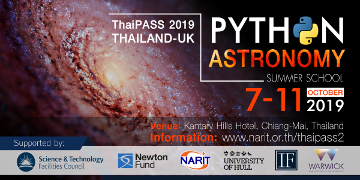Timetable (please check daily for any last-minute updates)
Quick links to: ● Day 1 ● Day 2 ● Day 3 ● Day 4 ● Day 5
Ask us anything (anonymous)- enter code on the board each day.
08:45 Welcome and introduction to the ThaiPASS Thai and UK teams. (slides)
+ Welcome speech by Dr Saran Pochyachinda (NARIT Director)
09:00-10:10 Overview of Python and its applications to astronomy (slides on Github)
10:10-10:30 Coffee break + Group Photo
10:30-12:00 Python activities (HR diagram)
12:00-13:30 Lunch
13:30-15:00 Python activities (Kepler's laws)
15:00-15:20 Coffee break
15:20-17:00 Python activities (Kepler's laws)
All Python activities today are led by James Keegans, Mikkel Kristensen and Iraj Vaezzadeh. The Python notebooks and solutions are available on Github.
09:00-10:10 From Atoms to Stars I: nucleosynthesis (Dr Richard Stancliffe)
10:10-10:30 Coffee break
10:30-12:00 From Atoms to Stars II: the lives of stars (Dr Richard Stancliffe)
12:00-13:30 Lunch
13:30-15:00 Python activities (Modelling Stars)
15:00-15:20 Coffee break
15:20-17:00 Python activities (Modelling Stars)
See Github for the slides, Python notebooks and instructions on how to log on to University of Victoria's Astrohub.
09:00-11:30 Python activities
All Python activities today are led by James Keegans, Mikkel Kristensen and Iraj Vaezzadeh (students are free to take breaks in between).
See Github for the slides,
Excursion Schedule- Please bring your ThaiPASS badge.
11:30 Lunch
12:30 Bus departs
13:30-15:00 MaeSa Elephant Camp
15:15-16:30 Queen Sirikit Botanic Garden
17:30 Arrival at NARIT & packed dinner
18:30 Tour of NARIT and observing night
20:00 Bus departs to hotels
Day 4 “Supernovae, galaxies and dark matter”
09:00-10:00 Supernovae (Dr Claire Cashmore)
10:00-10:20 Coffee break
10:20-11:50 Python activities
11:50-12:30 Structures in the Universe (Dr Claire Cashmore)
12:30-14:00 Lunch
14:00-15:00 Galaxies and dark matter (Mr Mikkel Kristensen & Mr Iraj Vaezzadeh)
15:00-15:20 Coffee break
15:20-17:00 Python activities
18:00 Banquet + participation certificates and prizes
See Github for the slides. Photos from the banquet are here.
Day 5 “University and Career Day”
09:00-09:40 STEM Career Talk I: Ms Pijarana Samukkan - British Embassy (slides)
09:40-10:20 STEM Career Talk II: Dr Supachai Awiphan - NARIT (slides)
10:20-10:30 Coffee break
10:30-11:10 STEM Career Talk III: Dr Nahathai Tanakul - NARIT (slides)
11:10-11:50 Studying in the UK: Kantanach Chayapong (Emmie) - British Council (slides)
11:50 Feedback session, lunch, and departure.
______________________________________
Day 1 (7th October 2019): Python I
We will revise the basics of numerical computing in Python e.g. loops, lists, functions, input/output, iterables, modules and python objects/types. This will be a revision of the material on ThaiMOOC, and extension of the pre-workshop tasks.
Students will be guided through a series of hands-on activities. Pair work or small-group activities will be introduced to foster interaction between participants.
Day 2: Stars and Atoms
Dr Richard Stancliffe will give lectures on the following topics:
-
Introduction to the lives of stars.
-
How do stars create elements? How does the mass of stars affect this process?
-
The production of elements under quiescent and explosive conditions.
-
Observational constraints, including recent data on pre-solar grains.
Today’s activities will focus on stellar models and data mining (data provided by the NuGrid collaboration). Students will use simple Python scripts to study stellar yields and pre-solar grains, and compare theoretical and observational results.
Day 3: Python II
Morning: A half-day course on using Python to handle and process data. Hands-on activities will focus on data visualisation.
Afternoon: Excursion to local attractions in Chiang Mai.
Evening: Dinner and observing night at NARIT.
Day 4: Supernovae, Galaxies and Dark Matter
Dr Claire Cashmore will give lectures on the following topics:
-
Introduction to supernovae and how they influence their surrounding environment.
This will be followed by a hand-on session on analysing simulation data with Python and comparing simulation results to analytical solutions. -
Introduction to galaxies and their observable properties such as rotation curves.
-
Introduction to dark matter and dark energy.
This will be followed by another hands-on session in which students will plot galaxy rotation curves with and without dark matter, and compare them with observational data.
Day 5: University and Career Day
This is a half day of short talks to sign-post students to further Python, data-handling, coding and astronomy beyond the scope of the summer school. We will also cover ways in which STEM subjects can be taken further at university level and as a career.
- Talks by NARIT researchers on: "What is it like to be an astrophysicist?"
- Talks by officers from the British Embassy and the British Council on studying in the UK the application process and scholarships.
- Closing talk by the organisers.
- Feedback session (ending by 12 noon).
- Lunch and departure.
วันที่ 1 (7 ตุลาคม พ.ศ. 2562): Python I
ทบทวนพื้นฐานการคำนวณในโปรแกรม Python เช่น loop ลิสท์ ฟังก์ชัน อินพุตท์/เอาต์พุต iterable โมดูล และ object ใน Python โดยหลักสูตรในวันนี้จะเป็นการทบทวนเนื้อหาใน ThaiMOOC และ แบบฝึกหัดก่อนการประชุมเชิงปฏิบัติการ โดยนักเรียนจะได้เรียนรู้และฝึกฝนทักษะทั้งหลายในกิจกรรมที่กล่าวมาข้างต้น เช่น กิจกรรมที่ต้องทำคู่กันหรือทำเป็นกลุ่มจะมีพี่เลี้ยงคอยดูแล
วันที่ 2 (8 ตุลาคม พ.ศ. 2562): Star and Atoms
ดร. ริชาร์ด สแตนคลิฟ จะบรรยายในหัวข้อต่อไปนี้
-
บทนำเรื่องวัฎจักรชีวิตของดาวฤกษ์
-
วิธีการสังเคราะห์ธาตุในดาวฤกษ์ ขนาดมวลดาวฤกษ์ที่มีผลต่อกระบวนการสังเคราะห์ธาตุ
-
การสังเคราะห์ธาตุในช่วงภาวะการระเบิด และภาวะสงบ
-
เงื่อนไขบังคับที่ได้จากการสำรวจ รวมถึงข้อมูลล่าสุดที่ได้จาก pre-solar grains
กิจกรรมในวันนี้จะเกี่ยวข้องกับการสร้างแบบจำลองดาวฤกษ์ และ การทำเหมืองข้อมูล (โดยอาศัยฐานข้อมูลจาก ความร่วมมือ NuGrid) โดยที่นักเรียนจะได้ใช้ชุดคำสั่งภาษา Python ในการศึกษา stellar yields และ pre-solar grains โดยการเปรียบเทียบผลลัพธ์เชิงทฤษฎี และการสำรวจ
วันที่ 3 (9 ตุลาคม พ.ศ. 2562): Python II
ช่วงเช้า: หลักสูตรครึ่งวันสำหรับการใช้งานโปรแกรม Python ในการดำเนินการข้อมูล กิจกรรมที่เกี่ยวข้องกับการสร้างภาพนามธรรมจากข้อมูล
ช่วงบ่าย: กิจกรรมทัศนศึกษาที่แหล่งท่องเที่ยวสำคัญในเชียงใหม่
ช่วงเย็น: ทานอาหารเย็นร่วมกัน และ กิจกรรมดูดาวที่สดร.
วันที่ 4 (10 ตุลาคม พ.ศ. 2562): Supernovae, Galaxies and Dark Matter
ดร. แคลร์ แคซมอร์ จะบรรยายในหัวข้อต่อไปนี้
-
บทนำเรื่องซุปเปอร์โนวา และอิทธิพลที่มีต่อสิ่งแวดล้อมของซุปเปอร์โนวา
โดยจะตามด้วยกิจกรรมที่เกี่ยวข้องกับการวิเคราะห์ข้อมูลโดยในโปรแกรม Python และ การเปรียบเทียบผลลัพธ์จากแบบจำลอง และค่าที่ได้จากการคำนวณ -
บทนำเรื่องดาราจักร และคุณสมบัติที่วัดได้ เช่น rotation curve
-
บทนำเรื่องสสารมืด และพลังงานมืด
โดยจะต่อด้วยกิจกรรมที่จะให้นักเรียนได้ลองพลอต galaxy rotation curve ในกรณีที่มีและไม่มีสสารมืด โดยการเปรียบเทียบกับข้อมูลที่ได้จากการสำรวจจริง
วันที่ 5 (11 ตุลาคม พ.ศ. 2562): University and Career Day
ในช่วงครึ่งเช้าจะเป็นการบรรยายให้กับนักเรียนที่ต้องการต่อยอดการเรียนรู้โปรแกรม Python การจัดการข้อมูล การเขียนโค้ด และดาราศาสตร์ในส่วนที่นอกเหนือจากที่อยู่ในค่าย รวมถึง STEM ในระดับมหาวิทยาลัย และสายอาชีพที่เกี่ยวข้อง
-
การบรรยายโดยผู้เชี่ยวชาญจากสถาบันวิจัยดาราศาสตร์แห่งชาติในหัวข้อ "ชีวิตของการเป็นนักฟิสิกส์ดาราศาสตร์"
-
การบรรยายโดยตัวแทนจาก British Embassy และ British Council ในข้อหัวการศึกษาต่อ ณ สหราชอาณาจักร และแนวทางการขอทุนการศึกษา
-
ปิดค่ายโดยคณาจารย์ และพี่เลี้ยง
-
ตอบแบบสอบถามการประเมินกิจกรรม (ก่อนเที่ยงวัน)
-
ทานอาหารกลางวัน และเดินทางกลับภูมิลำเนา

